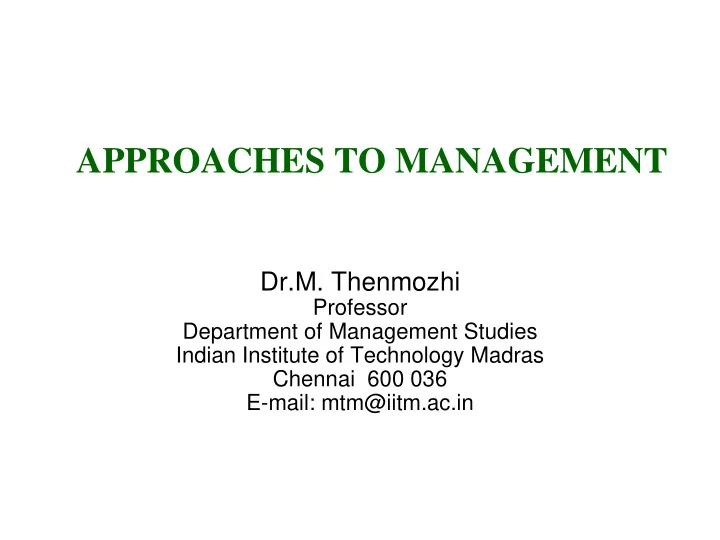

APPROACHES TO MANAGEMENT Dr.M. Thenmozhi Professor Department of Management Studies Indian Institute of Technology Madras Chennai 600 036 E-mail: mtm@iitm.ac.in
APPROACHES TO MANAGEMENT 1) Empirical Approach 2) Human Behaviour Approach 3) Social System Approach 4) Decision Theory Approach 5) Mathematical Approach 6) Socio-Technical Systems Approach 7) Systems Approach 8) Contingency Approach 9) Operational Approach
REASONS & PROBLEMS 1) Semantic problems in management literature. 2) Contributions from different disciplines. 3) Misunderstanding of principles.
EMPIRICAL APPROACH • Study of managerial experiences and cases(mgt) • Contributors: Earnest Dale, Mooney & Reiley, urwick. • Features – Study of Managerial Experiences – Managerial experience passed from participationer to students for continuity in knowledge management. – Study of Successful & failure cases help practicising managers. – Theoretical research combined with practical experiences. • Uses – Learning through experience of others Limitations • – No Contribution for the development of management as a discipline – Situations of past not the same as present.
HUMAN BEHAVIOUR APPROACH • Organisation as people – a) Interpersonal Behaviour Approach - Individual Psychology – b) Group Behaviour Approach - Organisation Behaviour • Features – Draws heavily from psychology & sociology. – Understand human relations. – Emphasis on greater productivity through motivation & good human relations – Motivation, leadership, participative management & group dynamics are core of this approach.
HUMAN BEHAVIOUR APPROACH Contd.. • Uses – Demonstrates how management can be effective by applying knowledge of organisation behaviour. • Contributors – Maslow, Herzberg, Vroom, Mc Cleland, Argyris, Likert, Lewin, Mc Gregor, etc. • Limitations – Treating management as equivalent to human behaviour. – Talks about organisation & organisation behaviour in vague terms.
SOCIAL SYSTEM APPROACH • Understanding the behaviour of groups & individuals. • Features 1. Social System, a system of cultural relationship 2. Relationship exist between external and internal environment of the organisation. 3. Formal Organisation - Cultural relationships of social groups working within the organisation. 4. Co-operation necessary 5. Efforts directed - harmony between goals of organisation & goals of groups.
SOCIAL SYSTEM APPROACH Contd… • Contributors – Pareto, Chester Barnard • Uses – Organisational decisions should not be based on desires of one group alone but should reflect the interests of all the parties. • Limitations – Broader than management & its practice – Overlooks many management concepts principles & techniques that are important to practising managers.
DECISION THEORY APPROACH • Manager – Decision maker • Organisation – Decision making unit. • Features – Management is decision making. – Members of Organisation - decision makers and problem solvers. – Decision making - control point in management – Increasing efficiency - the quality of decision – MIS, process & techniques of decision making are the subject matter of study.
DECISION THEORY APPROACH • Contributors – Simon, Cyert, Forrester, etc. • Uses – Tools for making suitable decisions in organisations. • Limitation – Does not take the total view of management – Decision making - one aspect of management
MATHEMATICAL APPROACH • Management- logical entity • Actions- Mathematical symbols, Relationships and measurable data. • Features 1. Problem Solving mechanism with the help of mathematical tools and techniques. 2. Problems Expressed in mathematical symbols. 3. Variables in management – quantified. 4. Scope - Decision making, system analysis & some aspect of human behaviour. 5. Tools - Operations research ,simulation etc.
MATHEMATICAL APPROACH Cont.. • Contributors – Newman, Russell Ackoff, Charles Hitch, etc. • Uses – Provided Exactness in management discipline . • Limitations – Not a separate school – Technique in decision making.
SOCIO -TECHNICAL SYSTEMS APPROACH • Features – Social & technicals systems interact. This interaction is important for organisational effectiveness. – Organisation – governed by social laws as well as psychological forces. – Technical aspects of organisation modified by the social aspects. • Contributors – Trist, Bamforth, Emery etc. • Uses – Organisational effectiveness depends on looking at people and their interactions and also at the technical environment in which they operate. – Change in technology – Change in social interactions at work place
SOCIO -TECHNICAL SYSTEMS APPROACH • Limitations – Lack of total managerial view – Concentrate on factory or other production system – No new contribution – People aware about the role of technology of the social system of the work place
SYSTEMS APPROACH • An enterprise • Man-Made system • Internal parts • Achieve established goals • External parts • Achieve interplay with its environment • Manager integrates his available facilities with goal achievement. • Uses – Quick Perception – Better Planning • Limitations – Complicated – Expensive
CONTIGENCY SCHOOL • In developing management concepts the environment within which the concepts are to be applied has to be considered. • Internal environment – Structure, Processess, Technology. • External Environment – Social, Economic, Political etc. • Features – Appropriateness of a management technique depends on situation. – If - Then approach.
OPERATIONAL APPROACH • Management is a process. • Universalist / Classist / Traditional Approach. • This school concentrates on the role and functions of managers and distills the principles to be followed by them. • Features – Functions of managers remain same – Functions of management – core of good management – Framework of management – Principles of management • Contributors – Fayol, Lyndall Urwick ,Harold Koontz, Newman, Mc Farland, Taylor. • Uses – Flexible & practical but not universal.
Recommend
More recommend